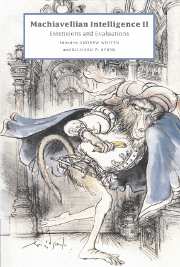Book contents
- Frontmatter
- Contents
- Contributors
- Preface
- 1 Machiavellian intelligence
- 2 Friendships, alliances, reciprocity and repair
- 3 Why Machiavellian intelligence may not be Machiavellian
- 4 Social intelligence and success: Don't be too clever in order to be smart
- 5 Minding the behaviour of deception
- 6 The Machiavellian mindreader
- 7 Exploiting the expertise of others
- 8 Primates' knowledge of their natural habitat: As indicated in foraging
- 9 Evolution of the social brain
- 10 The modulatory of social intelligence
- 11 The Technical Intelligence hypothesis: An additional evolutionary stimulus to intelligence?
- 12 Protean primates: The evolution of adaptive unpredictability in competition and courtship
- 13 Egalitarian behaviour and the evolution of political intelligence
- 14 Social intelligence and language: Another Rubicon
- Index
9 - Evolution of the social brain
Published online by Cambridge University Press: 23 November 2009
- Frontmatter
- Contents
- Contributors
- Preface
- 1 Machiavellian intelligence
- 2 Friendships, alliances, reciprocity and repair
- 3 Why Machiavellian intelligence may not be Machiavellian
- 4 Social intelligence and success: Don't be too clever in order to be smart
- 5 Minding the behaviour of deception
- 6 The Machiavellian mindreader
- 7 Exploiting the expertise of others
- 8 Primates' knowledge of their natural habitat: As indicated in foraging
- 9 Evolution of the social brain
- 10 The modulatory of social intelligence
- 11 The Technical Intelligence hypothesis: An additional evolutionary stimulus to intelligence?
- 12 Protean primates: The evolution of adaptive unpredictability in competition and courtship
- 13 Egalitarian behaviour and the evolution of political intelligence
- 14 Social intelligence and language: Another Rubicon
- Index
Summary
Introduction
The social intelligence hypothesis posits that the large brains and distinctive cognitive abilities of primates (in particular, anthropoid primates) evolved via a spiralling arms race in which social competitors developed increasingly sophisticated ‘Machiavellian’ strategies (Byrne & Whiten, 1988). The idea stemmed originally from observations suggesting that the polyadic interactions and relationships typical of anthropoid societies place exceptional demands on the ability of individuals to process and integrate social information. This hypothesis has been contrasted with foraging niche hypotheses, which propose that it is the need to find food in patchy, unpredictable environments, or even to extract it from awkward substrates, that required large brains and cognitive specialisation (e.g. Gibson, 1986; Milton, 1988). A major task in the study of primate cognition is to devise tests of these hypotheses.
In trying to establish the nature of cognitive adaptation, studies of the behaviour of individual species (whether experimental or based on field observations) are inevitably of limited value. While such studies may suggest what cognitive skills are used in meeting the demands of a particular lifestyle (e.g. Milton, 1988; Cheney & Seyfarth, 1990; Chapter 8), they do not in themselves provide tests of the evolutionary hypotheses. Indeed, they occasionally lead to the circular logic that primate species are good at the things that primatologists have chosen to study (such as complex sociality, or difficult foraging). This problem may also be compounded by ‘primatocentric’ reasoning, in which primate behaviour is automatically assumed to be more complex and clever, and more demanding of evolutionary explanation, than is non-primate behaviour.
- Type
- Chapter
- Information
- Machiavellian Intelligence IIExtensions and Evaluations, pp. 240 - 263Publisher: Cambridge University PressPrint publication year: 1997
- 108
- Cited by



